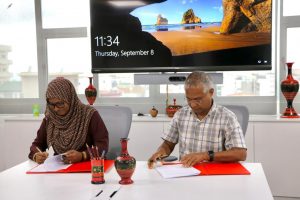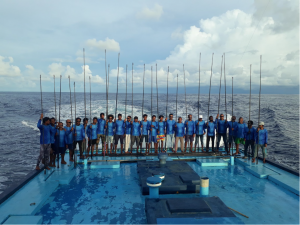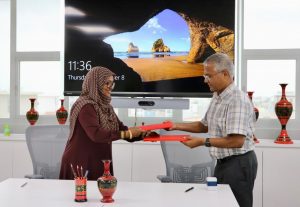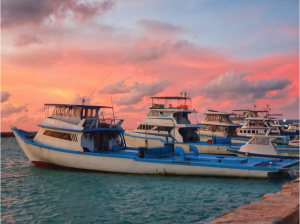An important Memorandum of Understanding (MoU) has been signed between the International Pole and Line Foundation (IPNLF) Maldives and Ministry of Economic Development (MoED) to collaboratively enhance the protection of migrant workers, through worker voice and empowerment.
The MoU sees both organisations commit to exploring opportunities to collaboratively engage in activities and share information that furthers the promotion of social and economic benefits of Maldives tuna fishing. A key activity of this MoU will be for IPNLF to provide support and assistance in facilitating multi-language translation services to the contents on the online platform and mobile application for expatriate workers being developed by MoED.
IPNLF will facilitate training on handling of grievance mechanisms as specified in the MoU and should provide greater assurance that fair working conditions are in place in the Maldivian tuna fishery, therefore meeting social responsibility requirements of the marketplace.

“We are excited to be working with IPNLF-Maldives on migrant workers issues, something we have been discussing for some time now. We hope to launch our platform with multilingual translations, rules and regulations relating to migrant workers in the Maldives”
Mariyam Nazima
Deputy Minister at the Ministry of Economic Development, Maldives
Pole-and-line fishing was first recorded in the Maldives over 900 years ago and this sustainable fishing method has been practised for centuries. The Maldivian one-by-one tuna fishing fishery (pole-and-line and handline) is now one of the largest coastal fisheries in the Indian Ocean and a key supplier to the global tuna market.
in the Indian Ocean and a key supplier to the global tuna market.
One-by-one tuna fishing provides a crucial source of income to its coastal communities and supports some 30,000 people, or 11% of the Maldivian workforce. It’s a cultural ‘way of life’, upon which, the fishers and local community depend. It is essential that especially vulnerable workers in these global supply chains are protected.
In signing the MoU, which is effective for 3 years, both MoED and IPNLF Maldives agree to the following

The social benefits of one-by-one tuna fisheries are most often closely associated with coastal communities in developing countries. They underpin local livelihoods, employment opportunities and food security. In order to prevent these fisheries from becoming marginalised within the marketplace, it is essential to effectively and publicly communicate and promote the importance of social benefits to the seafood marketplace.

IPNLF was founded out of a recognised need to better represent the one-by-one Maldivian tuna fisheries and has since grown to be a global organisation who are leaders in shifting the global narrative towards responsible seafood which duly considers the local, social and economic impacts as well as human rights issues in fisheries. They do so by empowering fishery stakeholders to assume more responsibility for workers’ rights and human welfare issues, through projects and collaborative initiatives, whilst upholding the cultural value of these age-old traditions in countries like the Maldives.
“The Maldives pole-and-line fishery is extremely important on a national and international level and it is essential that workers are protected. In the longer term, IPNLF’s work collecting social data and implementing social responsibility improvements will help inform fisheries management strategies for a more equitable future.”
Dr Shiham Adam
Director for Science and the Maldives – IPNLF Maldives